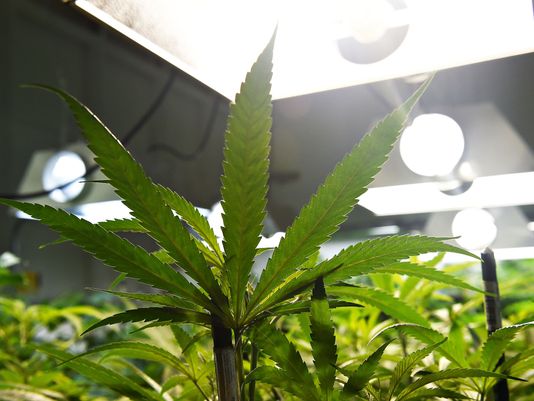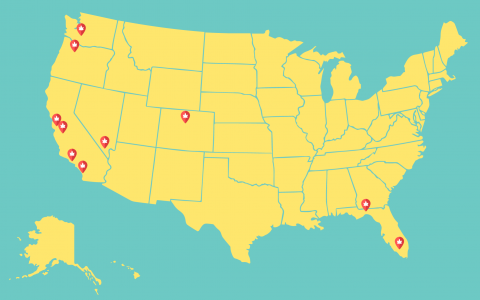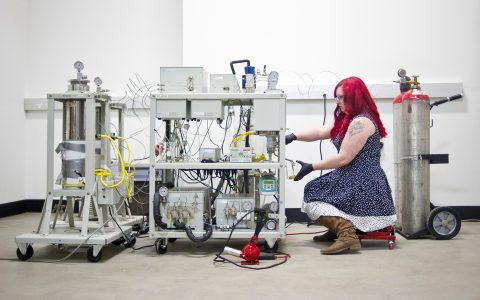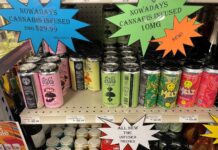When the Planet 13 Superstore opens its doors to the public on November 1, it will be the largest dispensary in Las Vegas. The 112,000-square-foot retail and entertainment complex is full of Vegas-scale spectacle, but it also needs a small army of staffers to get off the ground.
“We’re looking at upwards of 250 to 275 employees,” says VP of Sales and Marketing Tanya Lupien. “Our entire leadership, we’re all tag-teaming throughout the week and on the weekends, interviewing the candidates.”
Demand for cannabis-related jobs in Las Vegas is proving to be even greater than expected. “It’s fair to say we’ve had thousands of resumes and I’m not exaggerating,” says Lupien. “It’s overwhelming.”
A large applicant pool is a nice problem to have, but sorting out the good prospects from the bad can be tricky in an industry that’s still relatively new. Unlike bartending or food serving, you’re not going to have a lot of people with long-term experience budtending. And if someone walks through the door claiming “cannabis expertise,” how can you be sure that they are a responsible user who understands the intricate recreational and medical benefits of cannabis? It’s hard to predict.
Tanya Lupien, VP of Sales & Marketing at Planet 13
The key in scoring a job interview is having a qualified work history in sales and customer service. If someone is good at selling phones, clothes, or cocktails, they’ll probably be good at selling flower, tinctures, and edibles. According to Lupien, Planet 13 also looks for a positive attitude, coachability, and a passion for the cannabis industry. Familiarity with strains is considered a plus.
“It really is a unique animal,” she says of selling cannabis. “So if someone is afraid of the product, never tried it, or never wants to, that’s going to be a challenge for them from a sales perspective.” Here’s the starting point: just like any legal cannabis user in Nevada, you must be 21 or older. A professional appearance is required. No face piercings. If tattoos are visible on the arms, full sleeves must be worn.
“The biggest challenge is we’re trying to find quality and quantity simultaneously,” says Lupien. “And then we need to train all these people.”
The hiring process can be as quick as three weeks from “you’re hired” to working on the floor. Applicants typically submit a resume through an online portal and yes, it’s screened by a pair of human eyes, not a computer program. If the job seeker passes a phone interview, they’ll be invited to a one-on-one interview in person. If everything goes well, the job is formally offered.
The training itself is a week of classroom-style studying, followed by a week on the floor with a mentor.
To help meet demand, Planet 13 recently held a job fair at the Palace Station casino. Well over a hundred people were interviewed and 28 were hired within three hours.
“I think the cannabis space in general is paying a little bit better wage than what you’re seeing at retail and some of the service industries,” adds Lupien. “People are excited. It’s something different from a traditional casino or store.”
From Cars to Cannabis
Kim is a job seeker who represents the shifting dynamics of customer service in Las Vegas. She parked cars for years as a valet at restaurants and hotels—a job once viewed as a sure-bet money gig. That changed with the recent trend of paid parking on the Strip. With the new fees, drivers are less likely to valet and when they do, they’re less likely to tip.
“That’s when everybody took mega-blows,” Kim remembers. “Incomes of 80 grand down to 30 grand. That’s huge. That’s not just a couple hundred bucks. You have to change your lifestyle—and sell your house while you’re at it.”
At 35 years old, Kim is now looking for a job in the cannabis industry, drawn to the stability that comes with being part of a rapidly expanding economic sector.
“Coming into it, I wasn’t really a big user of marijuana—I would do it once in a blue moon,” she says. “But now that it’s legal, it’s really neat to be introduced to the variety of products. There’s a lot to learn.”
Kurt Duchac, WeCan
Believing that “knowledge is power” and realizing competition is fierce for dispensary jobs, Kim is hoping to set herself apart by securing an agent card in advance—required by Nevada to work in the cannabis field—and taking a series of classes by Trim Ready, an independent cannabis education service.
Kim believes earning certifications in both budtending and cultivation make her more valuable for a greater spectrum of opportunities.
Trim Ready operates in conjunction with WeCan, Wellness Education Cannabis Advocates of Nevada, which started as a medical marijuana social media group 10 years ago. The organization helped propel pro-cannabis legislation in Nevada and offers certification courses in budtending, product consulting, cultivation, manicuring, trimming, and extracts/infusion.
“We are licensed with the Department of Agriculture to grow hemp in the state of Nevada,” says WeCan Treasurer and Trim Ready Director of Operations Kurt Duchac. “We train on live product. So in our cultivation class, we do two hours of hands-on trimming and manicuring that qualifies as experience. In our extracts and infusion class, we show you how to extract the CBD from the plant and infuse it into edibles.”
Duchac also manages a dispensary himself, Top Notch, so he knows first-hand about the demand for jobs. “If I’m hiring once a month and I’m getting 20 applications a day, I’ve got 600 applications sitting on my desk from the last month,” he says. “So you want to set yourself apart. You want to show you’re prepared and ready in this industry.”
High-Performance and Upward Mobility
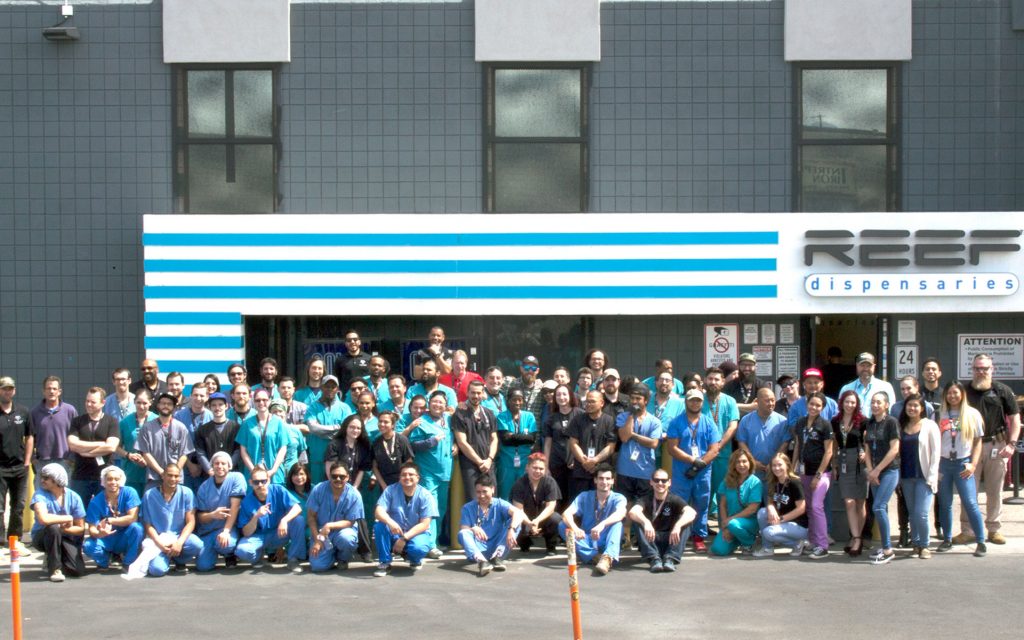 (Courtesy of Reef)
(Courtesy of Reef)
Tryke Companies is all too familiar with the challenges of staffing cannabis dispensaries. The holding company has six Reef dispensaries in Nevada and Arizona. Their main Las Vegas location is close to the Strip and only steps away from Planet 13.
“Every time we run a position for a budtender here in Las Vegas, we get 500 applicants a week,” says Chief Human Resource Officer Randall Gleave.
Thomas Tapusoa, Reef Dispensaries
When screening applicants, the company leans toward retail and customer service experience, but also takes careful note of the tenure at each job. “If they have budtending experience, we’ll probably take a look at them,” says Gleave. “But it also brings up a question of ‘alright, why did you already leave your job?’ because there aren’t a lot of old-time budtenders out there.”
Unlike most of their competition, Reef will only hire full-time budtenders. Everyone gets medical and dental benefits as well as paid time off, including eight paid holidays.
“The biggest challenge in Las Vegas is the lack of loyalty,” adds Gleave. “This is a very transient workforce. The hospitality industry has one of the highest turnover rates. So the challenge here is finding people who are looking to stay in one job for more than just a few months.”
Reef stresses upward mobility as another way to retain quality employees. Thomas Tapusoa was hired as a receptionist and climbed the ladder to the role of senior team lead, similar to a general manager position, that oversees about 70 employees. But before joining the company, he was a dancer on the Strip with shows at the Bellagio and Treasure Island.
Being a performer allowed him to break out of his shell and develop confidence—a quality that’s invaluable in not only sales, but interacting with first-time customers who might be nervous or apprehensive about shopping at a dispensary for the first time.
“It can be challenging for anyone to walk into a dispensary and right off the bat know what to do, what to say, and feel comfortable on that end,” says Tapusoa. “So for a budtender to be able to talk about the product and explain it to somebody who might be a little bit hesitant, that’s a really big [advantage] right there.”
Gleave is quick to point out that between Las Vegas, Reno, and Phoenix, the company hired more than 400 people over the past two years, but Sin City remains the toughest nut to crack. “There’s a lot of good people here,” he says. “You just gotta find them.”


